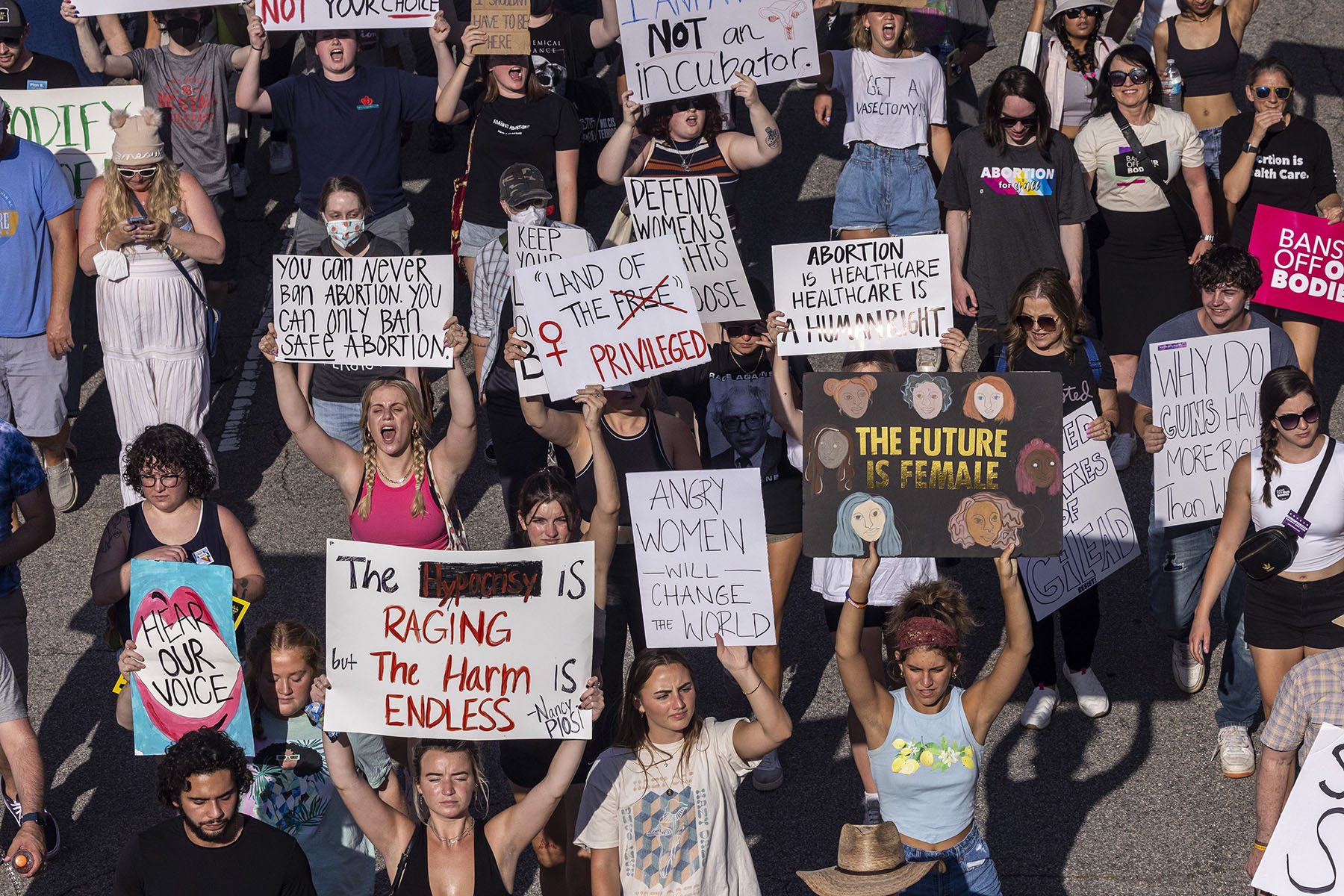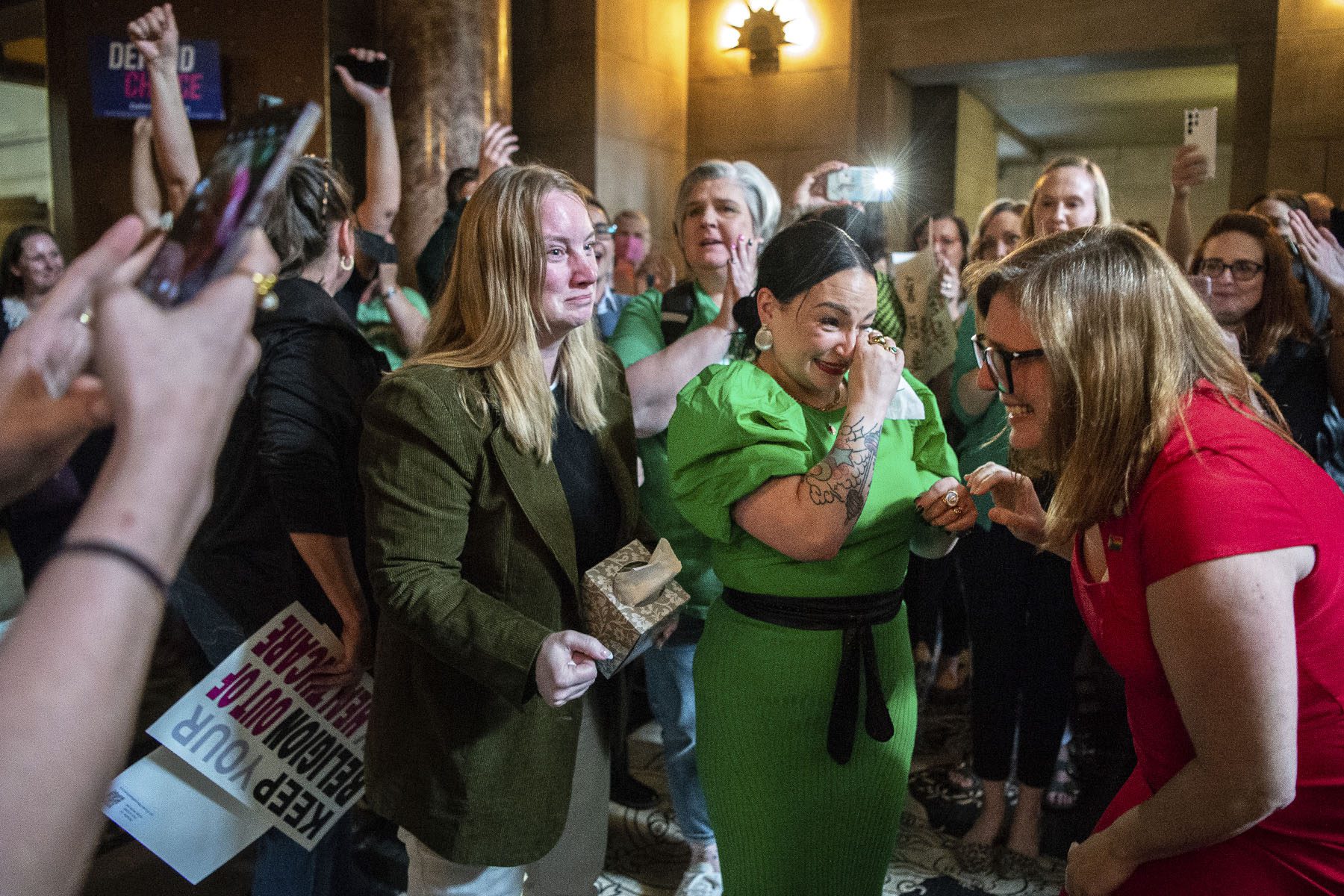We’re answering the “how” and “why” of abortion & politics news. Sign up for our daily newsletter.
With abortion bans becoming increasingly unpopular, Republican-led statehouses are walking a delicate line: Trying to advance bills that would restrict access to the procedure without drawing attention, circumventing normal processes to cram new policies through as legislative sessions come to a close.
Last year, Republican lawmakers across the country pushed restriction after restriction in anticipation of the looming Dobbs v. Jackson Women’s Health Organization decision, which in June of last year allowed states to begin banning abortion. But now that those laws can actually take effect, legislators are newly attuned to potential political consequences.
“Dobbs purported to be a state-by-state settlement, returning this to the states. We’re seeing that play out,” said Melissa Murray, a law professor at New York University who focuses on reproductive rights.
Lawmakers in a handful of states have pushed meaningful new restrictions.
North Carolina legislators crammed a 12-week ban through last week; Gov. Roy Cooper has said he will veto the ban Saturday, and the legislature, where Republicans hold a supermajority, is likely to override that veto next week. Florida has passed a ban on abortions after six weeks — before many people know they are pregnant — and in South Carolina, where efforts to pass a total abortion ban fell apart after a legislative filibuster, lawmakers appear on track to pass a similar restriction, with plans to work past the end of their session to do so. North Dakota outlawed abortions entirely. And in Nebraska, where efforts to pass a six-week ban barely failed, legislators are pushing a 12-week abortion ban, with the lawmaking session set to end in early June.
-
Read Next:
-
Read Next: 93 days: The summer America lost Roe v. Wade
The unpopularity of abortion bans means that lawmakers pushing restrictions have in some cases relied on tactics that critics say helped insulate them from popular will.
“The question of what to do now that there’s no constitutional right to an abortion and states can ban it — it forces a set of conversations and questions and concerns that haven’t happened in some of these places,” said Rachel Rebouché, dean at the Temple University School of Law. “It’s very hard to chart what’s happening on the state level, but I do think it boils down to a question of politics and the importance of state politics.”
Overturning Roe appears to have made abortion bans more unpopular than ever. Nationally, only about 1 in 3 voters support banning abortion in most or all cases, recent polling suggests. Only about 1 in 10 support banning abortion in all cases. And Americans are now more likely to say that abortion should be easier to access. That data has translated electorally, too: When given the opportunity, voters in states of varying politics — Kansas, Kentucky, Wisconsin, Vermont and California— have turned out in large shares in support of abortion rights.
That in turn has made it harder for states to pass new bans — at least, without attracting public scrutiny and criticism.

In North Carolina, the state’s 12-week abortion ban was pushed through with little time for debate. Instead of introducing a bill and then opening up legislation to a public committee hearing, a group of Republican lawmakers conferenced in secret to devise new legislative text.
“It was clear this was an attempt to limit the ability of Democrats to one, influence the bill and two, put things into the public record about the bill,” said Rebecca Kreitzer, an associate professor of public policy at the University of North Carolina Chapel Hill.
The 12-week ban proposal was announced at a news conference during the legislature’s busiest week of the year. The text was released at 11 p.m., attached in a 46-page conference report for another bill that was ostensibly about modifying the state’s “safe haven” law, which allows parents to anonymously give up newborns in designated places. Legislators passed the bill less than 48 hours after the text was first made public.
“That the bill has a 72-hour waiting period [for abortion], and we had the bill for less than 72 hours is ironic and just horrible,” said state Sen. Rachel Hunt, a Democrat from Charlotte whose father was the state’s longest-ever serving governor.
-
Read Next:
-
Read Next: North Carolina passes 12-week abortion ban
In keeping with the typical rules of the legislature, Hunt said, Democratic state senators had intended to each speak for 30 minutes in protest of the bill. But the Senate’s leadership adopted a different set of rules for the abortion debate, instead enforcing a 10-minute limit on how long people could speak and in some cases cutting lawmakers off if they went past that. That time limit — and strict enforcement of such — was “very unusual,” Hunt said.
GOP lawmakers in Nebraska, meanwhile, have pushed their 12-week proposal by attaching it as an amendment to a bill that would ban gender-affirming health care for transgender people younger than 19 — a surprise to many state legislators after the defeat of a proposed six-week ban. Abortion rights supporters in the state have argued that the move to include a 12-week restriction violates the rules of the state legislature, which allow bills to cover only one topic.
And in Ohio and Missouri, two states where abortion rights supporters are pushing to have voters weigh in directly on whether to protect abortion rights, Republican legislators are attempting to raise the threshold required for voter-initiated constitutional amendments. Neither such proposal has yet passed.
Still, the pushback against abortion restrictions appears to have changed what lawmakers have been able to pass, at least in the short term. Anti-abortion activists began the year eager to push for abortion bans in states where the procedure remained legal, and to find ways to prevent people from accessing medication abortion pills — especially in states with abortion bans.
But states where abortion is already banned — such as Texas, Oklahoma or Missouri — have seen little anti-abortion activity this year. Oklahoma’s session ended with no new abortion restrictions. Neither Missouri nor Texas has advanced a single anti-abortion bill thus far this year, despite lawmakers’ introduction of proposals to limit access to medication abortion or to limit sources of funding for people trying to leave the state for an abortion.
Instead of abortion restrictions, those states have prioritized restricting access to gender-affirming care, focusing largely on trans youth, Kreitzer noted. In Texas, the government has also focused on putting more money to support anti-abortion centers, which attempt to dissuade people from terminating pregnancies, and offer free, but often inaccurate, ultrasounds.
-
Read Next:
Texas has become the center of a new hotbed for the battle over abortion rights: the federal courts, where judges will decide in the coming months whether to limit access to mifepristone, one of two pills used for medication abortions.
“We’ve seen less state legislation in that area this year in large part because of the multiple federal lawsuits going on,” Glenn said.
One such case, which will be argued before an appeals court next week, was originally filed in Texas, where plaintiffs have more leeway in choosing who will hear their case — a practice known as “forum shopping.”
That too, some scholars noted, could offer one of the most meaningful avenues to restrict access to abortion — and is also insulated from democratic pushback. Federal judges can have the power to effect policy that may not be able to get the votes to pass in a state legislature. They are also unelected, and not typically held accountable to voters.
“It’s revealing [Republicans are] focusing on the courts,” Kreitzer said. “In the long term, Republicans know they are on the losing side of some of these issues, so they are trying to finalize things as quickly as they can.”
But in the immediate term, that’s been made difficult by the political reality of uniting enough lawmakers around strict abortion bans.
Before turning to a 12-week ban, Nebraska Republicans pushed a six-week restriction, which failed due to a legislative filibuster; Republicans fell one vote short of the supermajority needed to override that filibuster.
South Carolina’s conservative House of Representatives tried to pass a total abortion ban but was unable to find support in the Senate , thanks to a filibuster by that body’s five women members. Abortion opponents in the state have since framed a six-week ban as a compromise. The state legislature, whose session was scheduled to end Thursday, will have to return for extra lawmaking days specifically to find the time to pass a ban palatable to both chambers.
Anti-abortion activists acknowledge they have had to scale back their ambitions this year in part because of the backlash to more onerous restrictions.
“It’s the reality of where the public is and even where the majority of lawmakers are,” said Katie Glenn, state policy director for the anti-abortion Susan B. Anthony Pro-Life America.
In states like Nebraska and South Carolina, she suggested, stricter limitations had the support of most Republican lawmakers — but that wasn’t necessarily enough.
“That type of a process can be very frustrating, especially when you’ve got 60 percent [lawmaker support], not the 65 we need. It can feel like, ‘Why should we have to bend for one person?’ But you can also understand it as a step-by-step process.”
But even an incremental approach, she said, can over time dramatically curb access to abortion. Glenn pointed to Florida, a state where two years ago, it was impossible to get a 20-week ban out of committee. Last year, in the lead-up to Dobbs, a conservative majority passed the state’s 15-week ban, which is currently in effect. This spring, the state’s six-week ban sailed through the statehouse, where Republicans now hold a supermajority. The bill will not take effect unless the Florida Supreme Court rules this summer to strike down the state right to an abortion.
Other states could take a similar path. In North Carolina, House Speaker Tim Moore told reporters that the 12-week ban was sufficient policy for now but indicated openness to revisiting abortion restrictions in future years. And if Republican Lt. Gov. Mark Robinson is elected governor in 2024, state legislators would no longer need a conservative supermajority to pass anti-abortion policy.
It’s not clear if South Carolina and Nebraska could pass stricter laws in coming years — but the slim margins by which their proposed bans failed suggests it’s likely, Murray said.
“They overplayed their hand but that doesn’t mean they can’t come back,” she said. “They were rejected, but not overwhelmingly so. That to me is the bigger story.”
Only two states — Florida and Idaho — have passed abortion ban exceptions for people pregnant as a result of rape or incest. Efforts to add such exceptions collapsed this week in Louisiana, and similar bills in Oklahoma and Tennessee died earlier this year.









